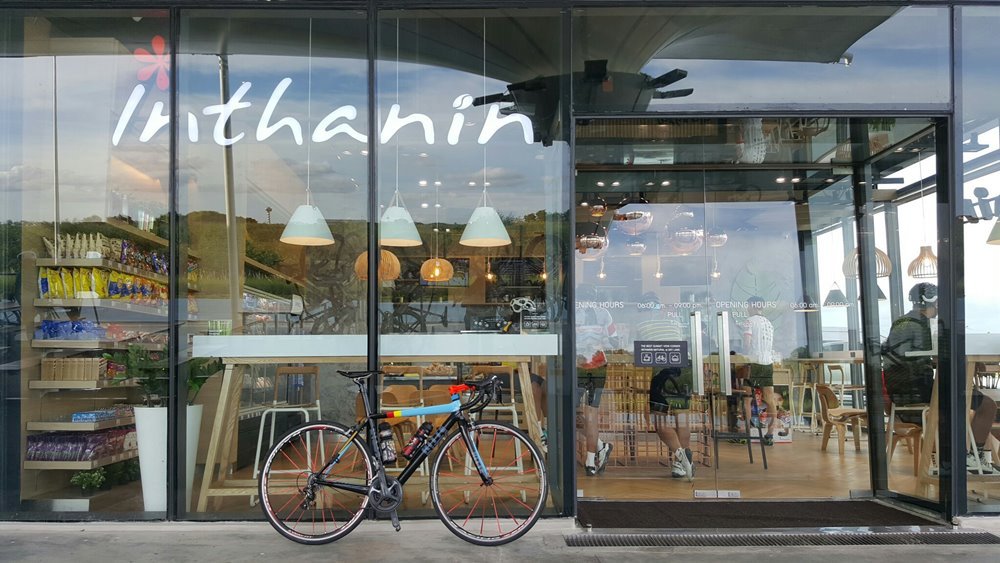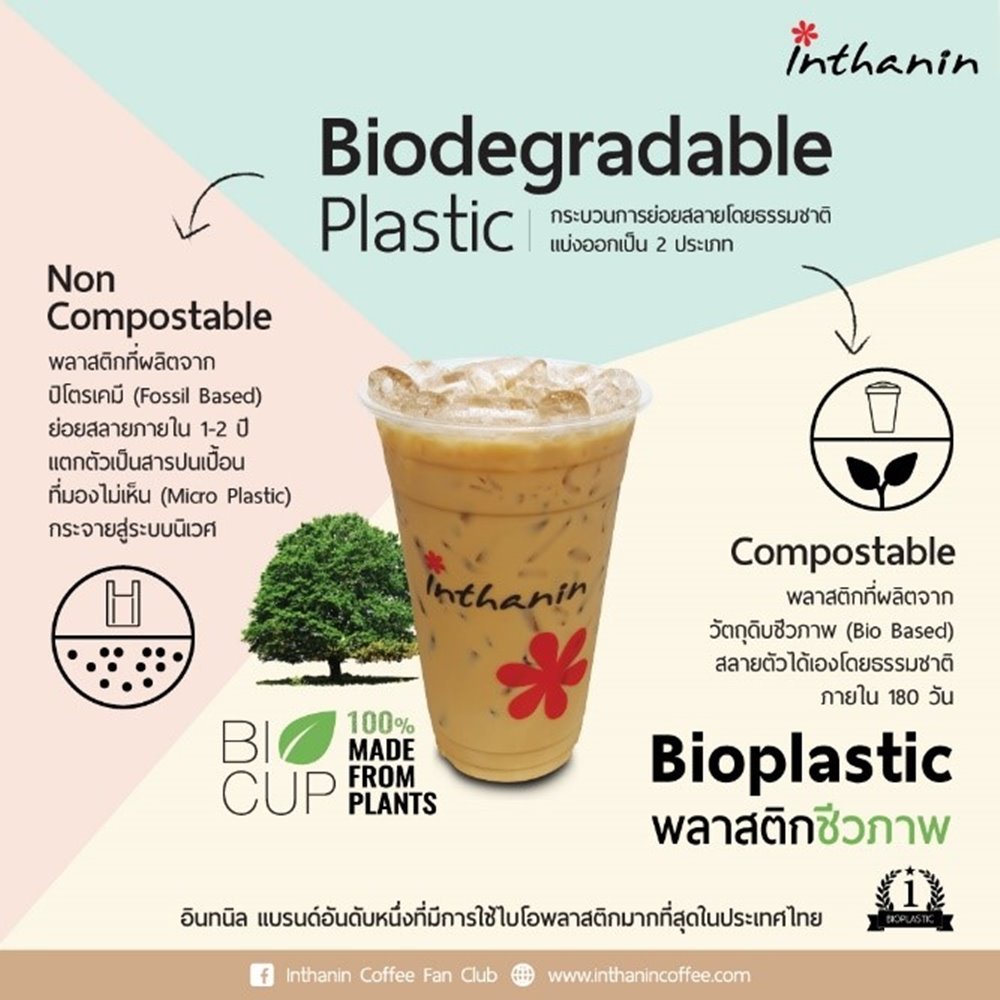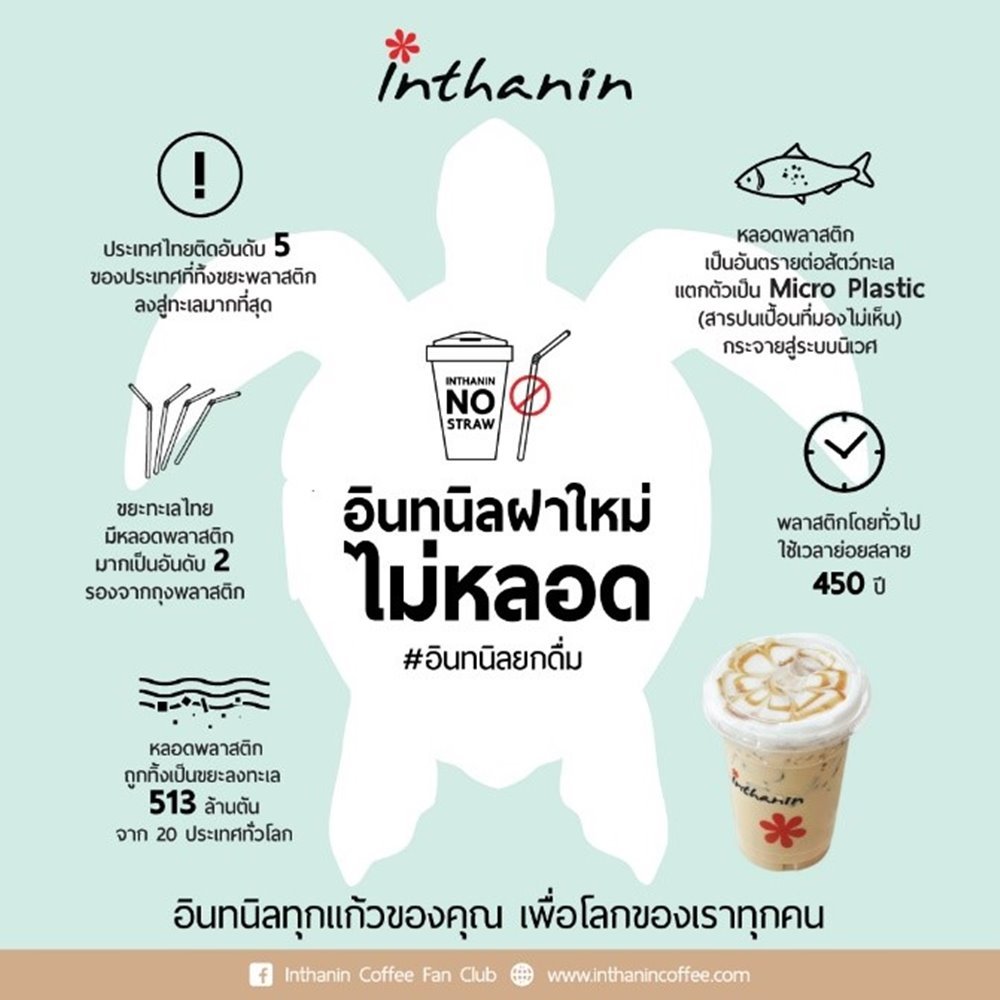05 October 2018
'New lids without straws' – Inthanin in a push to raise environmental awareness and underscore its leadership role as the only Eco Brand in Thailand's coffee market and number one brand using the most bioplastic cups in Thailand
Inthanin underscores its leadership role as a Thai brand with a green heart that uses premium-grade Thai coffee by spotlighting its positioning as an environmentally friendly Eco-Brand. The company is in a push to change the lids of its coffee cups, stop using plastic straws and introduce bio-cup for takeaway hot coffee. The 100-percent biodegradable bio cup – made from plant biomass – decomposes within 180 days.
The move is part of Inthanin’s efforts to raise public awareness of environmental protection among new generation consumers and their role in taking care of social and environmental issues. The company believes that by taking a clear stance on reducing plastic waste, it will be able to strengthen the Inthanin brand as the leader of the Eco Brand market in Thailand following Inthanin’s success in switching to bio-cups since 2015. By the end of 2018, Inthanin aims to reduce the number of plastic cups by 60 million cups and replace them with compostable bio cups.
Mr. Chaiwat Kovavisarach, President and Chief Executive Officer of Bangchak Corporation PCL, comments that Inthanin, a coffee shop chain in the Bangchak group, opened its first outlet in 2006. Over the past years, we have developed Inthanin into something more than a coffee shop under the concept “More than just a high-quality coffee”. Under this development scheme, Inthanin sets out to provide food and drinks in different styles. In 2016, the company started operating Inthanin Garden with the use of organic arabica beans bought directly from coffee farmers in Chiang Mai apart from 100 percent authentic arabica beans used in general Inthanin outlets. Thanks to its social and environmental responsibility policy, the company has embarked on a campaign to encourage customers to bring their own cups when purchasing coffee to reduce the use of plastic cups. They get a 5-percent discount as a token of gratitude for the gesture. Inthanin is the first coffee shop that has come up with this sort of campaign. Over the past years, Inthanin’s customers have managed to reduce plastic waste by about 200,000 cups per year.
“With Inthanin’s clear stance on plastic waste, Inthanin coffee is served in bio-cups using 100 percent plant biomass that takes 180 days to decompose. At present, Inthanin is a brand that uses bioplastics and is ranked number one in Thailand for using the most bio-plastics, especially in the coffee business. Now many coffee shop operators have switched to these biodegradable cups. This is a good index that we are satisfied with. At least we have enabled people in society to awaken to the realization that these issues are important. Lately we have replaced takeaway hot coffee cups with paper cups coated with biodegradable plastic (BioPBS) at more than 500 outlets since November 2018. We can say that every Inthanin coffee cup of yours is designed for our world. When introducing biodegradable cups for the first time, we only hoped that the move would help reduce single-use plastics. But today we are the brand that succeeds in doing away with the most plastic cups and the number one brand that has used the most biodegradable bio cups totalling more than 60 million cups in the past three to four years,” he says.
Thanks to Inthanin’s consistent packaging development, the company places great importance on reducing plastic straws, the dominant waste in Thailand’s seas. To achieve this, Inthanin has introduced redesigned lids of coffee cups so that customers can drink from the cups without using a straw since September. The new lids have been introduced to Inthanin Coffee outlets at M Tower (Bangchak Corporation’s head office), Government House, universities and other locations nationwide. The company aims to reduce plastic straws by about 25 million pieces by the end of 2019.
“Despite our commercial considerations, Inthanin as a business has never allowed profit to take precedence over our goal of raising environmental awareness among our consumers and environmental groups. By this, we expect that they will have a better understanding of the brand's DNA and the need to reduce plastic waste. Every cup of Inthanin coffee has a lower profit margin than that of other brands. We use 100 percent arabica and organic arabica beans from local community farms. We use biodegradable cups at all branches. Overheads for each cup are higher when compared to others. But consumers feel they can take care of society and help farmers who grow coffee. Though the company reduces plastic waste by about 20 million cups per year, the amount doesn’t seem much when compared with the overall plastic coffee cups used generally. But at least we are part of the efforts to take care of this world together. Each of Inthanin’s 100-percent biodegradable cups is compostable in 180 days. The cost of each cup is nothing in comparison with the cost incurred from plastic waste management. If everybody agrees on this, drinking a cup of Inthanin coffee means Inthanin gives greater value to our customers. Viewed this way, the value is greater than the price of a cup of coffee. That’s our success,” says Chaiwat.
According to a survey by the Green World Foundation, Thailand ranks fifth among the countries that dump plastics into the ocean, Which includes plastic straws. Statistics show up to 513 million tons of plastic straws are dumped into the sea by 20 countries worldwide. A study by the Department of Marine and Coastal Resources, the Ministry of Natural Resources and Environment shows that among the garbage found at sea, plastic straws rank second after plastic bags. Therefore, it seems we are only taking small steps, but these steps have a powerful impact on people’s awakening to the reality that we are part of the efforts to help protect the environment. Bangchak considers this to be its key mission under its good governance policy to develop sustainable business innovations that take the environment and society on board.
At present, Inthanin is not only the number one brand in using the most biodegradable plastics in Thailand and the leader when it comes to biodegradable cups for the coffee business, the company is also one of the brands using the most organic arabica beans (in Thailand’s coffee industry) that amount to 15 tons per year. By the end of this year, Inthanin will launch a project titled “Contract Farming” in collaboration with coffee plantations in northern Thailand. The company makes sure that the project will provide support to local coffee farmers by buying up to 30 tons of organic coffee beans from them by 2019.
At present, there’s a limited understanding of bioplastics among Thai people. Bioplastic or biodegradable plastics are divided into two categories. The first is non-compostable, or fossil-based plastic that is oxo-degradable or photo-degradable in one or two years. It is compostable in the eco-system and ultimately transform into micro-plastics.
The second category is compostable, bio-based plastic (bio plastic) that is degradable in 180 days. Inthanin’s bio cups are biodegradable bioplastic made from bio-based materials that are 100-percent compostable in 180 days. It is considered to be environmentally friendly plastic.





